by The People’s Minister of Information JR
Aaron Patterson’s story came to national attention after a campaign was waged by people in Chicago to expose the torture and forced confessions of over a hundred Black men by police officers under the tutelage of Vietnam vet and longtime police officer Lt. Jon Burge. The campaign broke ground in 2003-2004, when Aaron Patterson and three other defendants were released and pardoned by Illinois Gov. Ryan, who then put a moratorium on the death penalty.
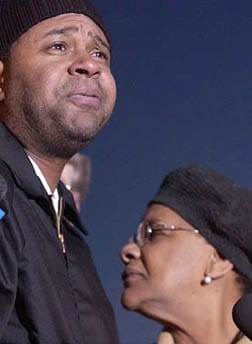
After Aaron was released, he jumped into local politics to expose what was done to him and others at the hands of the police as well as the prosecutor’s office. After Aaron Patterson had been on the streets for three years wreaking havoc on the corrupt Chicago political machine run by Richard Daley II, he was set up and convicted again on some COINTELPRO-like bogus charges of conspiracy to sell guns and narcotics and given 30 years.
Just like with political prisoners Mutulu Shakur, Veronza Bowers, Hugo Pinell, Ed Poindexter, Mondo we Langa, Ruchell Magee, Romaine Chip Fitzgerald, Abdul Majid, Albert Woodfox, Mumia Abu Jamal and so many others, the community owes it to Aaron Patterson to fight on his behalf because when he and the comrades were on the streets, they were fighting for us harder than we were fighting for ourselves. We should never forget those among us who have made the ultimate sacrifice for us to see a better tomorrow in this country in which most of our ancestors were brought to these shores as prisoners of war.
Free Aaron Patterson and free all of our political prisoners!
I caught up with Aaron Patterson’s lawyer, attorney Demitrus Evans, to get the story firsthand. This will be the first in a series of stories that I am working on to expose the cases of current day Black political prisoners in this country, because it is very important that our people know the truth about how this government deals with the people who truly do work on behalf of our empowerment. Check out the words of attorney Demitrus Evans as she talks about Aaron Patterson.
M.O.I. JR: Who is Aaron Patterson?
Attorney Demitrus Evans: I think Aaron would consider himself a political prisoner. He is a very charismatic leader and product of a middle income African American educated family. His mother taught at a college level and made sure that he was educated and well informed from a young age, and his father attained a very high status in the Chicago Police Department.
Aaron was taught, knows and understands much about the world on all levels, but intimately politics on a national, international and local level. His memory is superb, heart is huge and spiritually he has studied at least two religions that I am aware of: Christianity and Islam. He has a deep love for people and his heritage and thus hates suffering.
Aaron, when he was out of prison, could always be found organizing around a cause. His tactics for approaching the oppressive system have been geared towards individuals at higher levels in government, especially those that he sees as obtaining their status through deceptive means which allow those under them to suffer. Within the Black community, he has been very influential at bringing to light injustice on many levels of police brutality.
I think Aaron would consider himself a political prisoner. He is a very charismatic leader who was taught, knows and understands intimately politics on a national, international and local level. His memory is superb, heart huge. Aaron, when he was out of prison, could always be found organizing around a cause.
At the age of 17, he was a very high ranking member of a powerful street gang which the city officials had to take notice of at a time when there were plans for gentrification. Aaron made sure the injustices the community experienced were highlighted as these changes were taking place.
He saw the gentrification as a political issue to uproot Blacks, but was also moving to have the land that Blacks were on redistributed. Having studied the plight of Africans and others across the globe, he connects to struggle and injustice.
In 1987 he was falsely accused of a double murder with bogus evidence. Tortured into a confession about the murders, the confession was used against him and he went to prison. However, when he was in the police station being tortured, he meticulously etched in a bench that he was being tortured.
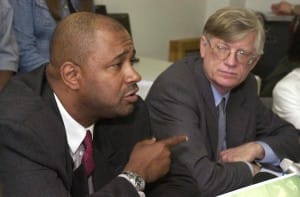
As no one tortured before him had had the foresight to make the memorial statement, Aaron’s case was brought to light through media which caught international attention, but this was after he was found guilty and had spent time on death row. His case was highlighted by Amnesty International and he became somewhat of a poster child for police brutality and the Jon Burge cases in the Chicago area.
As fate would have it, he, the community and lawyers worked for a pardon, which he was granted after 17 years in prison. When he walked out, Aaron saw that life had changed on the outside and now he had to rush to help the communities that needed him.
He jumped right back into his causes without dealing with the pain and injustice that he had personally suffered. His opponents had gotten stronger and somewhat smarter.
M.O.I. JR: Can you talk about the recorded phone conversations that are in the possession of the court, where Aaron talks about wanting to buy FAKE weapons?
Attorney Demitrus Evans: There was a press conference after Aaron’s release from death row that a task force was planning to clean the guns from the communities in Chicago. Aaron confronted the federal prosecutors, mayor and police chief with planting guns and drugs within the Black community and interrupted their press conference.
They didn’t just sit back. The informant who was chosen was also the leader of a high ranking Hispanic street gang whom Aaron had come to know from their mutual positions, was given many perks to work with the police to “get” Aaron.
In one of the tactics, Fox was asked to sell Aaron the guns. Fox, not out of any real loyalty to Aaron – not that they were direct enemies – but out of having the police as a common enemy who were now asking for his help, told Aaron the plan of the police, but only after Fox was secure that his family was relocated and he had the perks he required, which included financing.
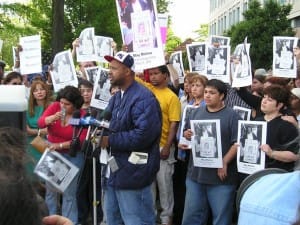
Fox explained to Aaron, on at least one occasion, that he was wired and that they would have to be careful, but the police where trying to set him up with FAKE guns. It wasn’t that the guns were really fake, as I saw, held and examined them in the AFT office; it’s just that they never belonged to anyone outside of the ATF. They were used as props or bait.
Aaron believed that he could, with Fox’s help, outsmart the authorities for trying to set him up. Fox explained, on the wire tape, what they were trying to do and told Aaron to “play along” to a certain point, never actually touch the guns and then at the moment when the police believed they “got him” have the media on speed dial and call them to the scene to get it all on tape, including Fox’s wire tape where the plan was explained. In this way the world would see the police trap fall to pieces.
Well, the plan didn’t exactly happen that way and Aaron was arrested before he could call the media. Fox, interestingly enough, was willing to admit to the tape when he testified, because his plea agreement was already completed: He had been released from jail, had money from the deal and his family was relocated. When it came time to try to prove that Aaron was never going to purchase guns, the recording was lost or buried.
Aaron continuously talked about the tape recording though, saying that he had a defense. He released the story to the media, but since I could not find the cassette in discovery and the prosecutors began to act as if it did not exist, it many times appeared like he was making it up.
Finally the court ordered the tapes to be released again. When we got it, it was played in open court. When it was heard by a packed court, the judge said she “could not hear anything about ‘prop’ guns” – although everyone else heard it.
It was clearly a conversation between Aaron and Fox about the setup and what Aaron’s plan would be to reveal the trap. I think it mostly pissed off the prosecutors, which did not take much to do.
They had been made to look pretty foolish by Aaron bringing out all of their flaws and all the mistakes made by Northern District of Illinois prosecutors over the past 20 years – including prosecutors allowing informants to have sex in their offices so they could get convictions – so they were desperate to do all that they could to imprison him.
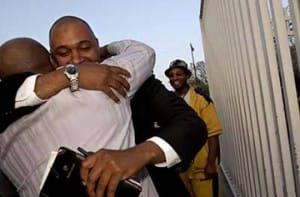
The court – well, I believe Judge Rebecca Pallemeyer’s integrity was on the line. Her courtroom was like a zoo, because the community was there watching all that was happening and the prosecution was being made to look silly by Aaron.
Along with Aaron’s case, she was presiding over the case of Gov. George Ryan to oversee his prosecution for fraud. It was very political, since Ryan had pardoned Aaron after receiving evidence that the police framed him for the murder for which he was on death row.
Having it revealed that the police had once again set Aaron up meant that the court was faced with prosecutorial misconduct, which meant Aaron was free and his case could not be used against Gov. Ryan. The federal case was called “Operation Kill Two Birds With One Stone.” The gang that Aaron ranked in was the Black P. Stone Nation.
Confronted with all this information, the court literally left the bench and acted as if the tape did not say what it said. She then attempted to go forward with hearing the prosecution as if it never was played – a tactic that Aaron would never have allowed. He told her about it in open court – a confrontation that as a sitting federal court judge she could not allow.
M.O.I. JR: Who was the lawyer that was put on Aaron’s case? And why did him and Aaron get into a confrontation in court?
Attorney Demitrus Evans: Tommy Brewer, now “The Honorable Tommy Brewer” (unless he has been put off the bench; I have stopped following his career) was a 20-year or so veteran with the CIA. As an African American, he worked in the Black community in Chicago after he left the CIA in the private sector, but people could never really tell where his loyalty was.
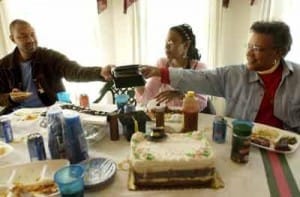
He sort of straddled the fence, talked a good “Black power” game, but always there were skeptics. The People’s Law Office, which works on exonerations and had been very instrumental in helping Aaron prove his innocence to Gov. George Ryan (Aaron would say they had ulterior motives; they wanted to prosecute the lawsuit, which is where the money was, but I would say nonetheless they were helpful) asked Tommy Brewer to help on Aaron’s criminal case that I represented him on.
Aaron was arrested after he had interrupted the press conference discussed earlier. Imagine this: Fred Hampton Jr. with a bullhorn yelling questions about “why they were allowing the guns into the neighborhoods in the first place and what they were going to do about police brutality etc.” Needless to say, making the federal prosecutor’s office and the chief of police look like fools in the media meant retaliation.
Two days or so before the arraignment, Tommy Brewer went out of town and could not be there. I had worked for Standish Willis, a prominent and very progressive Black civil rights attorney and longtime organizer in Chicago, who used to be in the People’s Law Office, so they called Standish to represent Aaron.
He could not and told them to call me. I was a panel attorney and had to be in court that day anyway and so I contacted the panel office and I was appointed. This meant the defense was to be paid for by the government.
In theory, all defendants have the right to a free defense lawyer if they cannot afford one. “Free” has many connotations, because legal defenses cost. As I alluded to, if the lawyer cannot obtain funding for the defense because it needs to be approved and you have a team of lawyers and support staff in opposition, the question is begged, “Do you really have a defense?”
So I represented Aaron alone. When he returned, Tommy Brewer “acted” as if he were going to help. I think he initially filed an appearance, but all the discovery was delivered to my office and although I attempted to call his office and split the work, he never agreed to meet with me and he never actually did any work on the case.
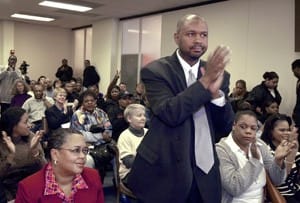
At some point, it became obvious to Aaron that Tommy was a flake and Aaron fired him, which left only me. Tommy seemed not to care. I did need help, however, and had been requesting that Aaron be appointed a second lawyer to help through the court.
I was denied until one day, a lawyer who knew almost nothing about the federal system was appointed to help me, Paul Camarena. He knew how to research, but other than that he was very green. I was grateful even for that help though because there was a lot of work and the prosecutors continued to create motions for responses and argument. The only thing that I did not know was that Paul had aspirations of being a prosecutor.
The case, however, got a lot of attention in the months that followed, and Tommy was running for some office. To my understanding – I am not actually from Chicago – Tommy ran for several elected offices and has always lost until he was elected as a judge after Aaron’s case.
Just about the time the media picked up on the audio tape and Aaron was upset, the court decided that Aaron did not have to come to court for the next set of pretrial motions. However, the marshals brought Aaron anyway.
He did not want to be there and the judge had said, “Don’t bring him,” but on this day they brought him and the judge then said that she “had not said that” or something stupid that pissed Aaron off, and he told her and moved towards the bench while he was talking. There had been a shooting involving a different federal court judge earlier that year (the judge’s husband and mother were killed by a defendant in retaliation for a ruling, really sad) and the marshals were on high alert.
When Aaron did that, they threw him against a table, which broke, and it caused another media commotion. For whatever reason, Tommy Brewer was in the audience and “came to assist and calm Aaron down.”
Neither Aaron nor I asked him to help, but he took it upon himself, said he knew how to handle Aaron. Truth is Aaron was rightfully pissed, as the judge had made a ruling and then went back on it. I really think she was under a lot of pressure to prosecute Aaron, and Aaron had made a mockery of her, the prosecutors, the court system etc.
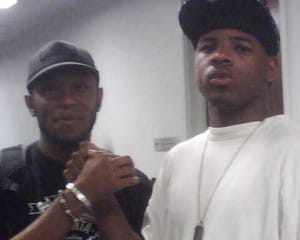
Tommy then asked that he be appointed. The court ordered that Tommy and I go and see Aaron in his cell and discuss the defense. When we got there, Tommy told Aaron that he, Tommy, was the head INFORMANT on Aaron’s case.
Aaron and I exchanged looks, because Tommy did not say anything else. We waited on him to correct himself, because we assumed that he made a mistake. We thought that he would say, “I meant ‘head attorney’ on the case,” but he never did. We were left to assume that he told us the truth. Aaron told me to make sure that Tommy was not appointed on the case.
When we left the meeting, Tommy asked me to grab a bite to eat at the restaurant close to the prison to discuss the case. I agreed.
On the following Monday, I received an “Emergency Motion” to go to court. When I got there, Tommy was already there. When the judge asked what the emergency was, he asked the court to appoint him on the case.
I objected based on Aaron’s wishes, but she appointed him. However, she said that she was going to keep me on the case. Remember that Aaron was not there and had already told the judge that he did not want Tommy on the case. Tommy had also previously filed a motion to withdraw, citing that there were irreconcilable differences between him and Aaron because he had been fired.
After that, Tommy started talking extensively with the prosecutors and refused to continue the defense. He said that he was not calling any witnesses but would let “Aaron speak,” which I disagreed with because there was plenty of support.
The next time Aaron was in court he asked to remove Tommy, but the judge kept him on; and then Tommy Brewer asked to have me removed from the case and the court granted the motion above Aaron’s objections. It was blatantly obvious at that point that there were forces working that were beyond our control.
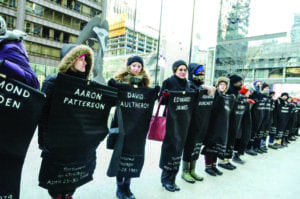
I was barred from the courtroom. However, Aaron got word to me that the officer who arrested him was going to testify and that I should give Paul Camarena the piece of paper that Aaron had in his pocket at the time of the arrest which had the media names and numbers on it to call them right before the police and the ATF were able to go forward with their setup of the guns.
I asked Paul to come into the hall and told him what I was going to do: go to my office and find the paper so that when this officer took the stand to testify about the arrest Paul could question him on the paper and that way get in the evidence of Aaron’s attempt to show the world what the police were doing.
Paul originally agreed, but when I came back and asked the guards to get Paul, they would not let me talk to him and he refused to come into the hall and get the paper from me. Then he told the judge that I had stolen valuable discovery from the defense.
The truth is, Tommy Brewer had never come to pick up any evidence from my office after he was appointed although I had asked him. He told me that “the prosecutors gave him all that he needed.”
The judge ordered the marshals to arrest me and take me back to my office to gather all the evidence on the case and deliver it to Tommy’s office. The media followed the arrest and the delivery and it was made to look like I had tried to keep Tommy from getting the discovery. Very strange.
Following all of this nonsense on TV, Aaron confronted Paul and Tommy the next day in court and I guess they lied. That is when he “attacked” – or really pushed Tommy in court.
Since they made Aaron sit in court in chains on his hands and feet, there was really no attack. I was not in the court, but after talking to Aaron it was clear that Tommy was not putting up a defense.
M.O.I. JR: Can you talk a little bit about the informant in Aaron’s case making a number of phone calls to Aaron? What were the informant’s plans?
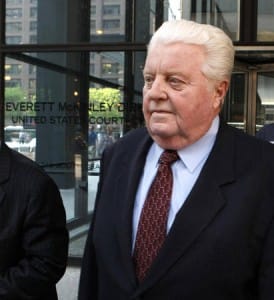
Attorney Demitrus Evans: I have discussed it a little, but basically Fox wanted to help himself and hurt Aaron as little as possible. However, to be an informant and keep the police happy and get his deal, he had to do something. He called Aaron and they attempted to devise a plan to turn it around on the police. Fox talked about it on the stand, is my understanding – I was barred from the courtroom – but in the end Fox got his deal: money, shelter, relocation.
M.O.I. JR: Can you talk about the history of Chicago Police Lt. Jon Burge? What are some of the things that he used to do to Black prisoners?
Attorney Demitrus Evans: Burge learned torture techniques in Vietnam and was very good at putting electrical wiring on the testicles of black men to make them confess. He also helped develop a technique of beating a prisoner with a phone book in between so there would not be marks.
He put guns in their mouths and he played Russian roulette with them and a loaded gun. His torture spans from the ‘80s in Chicago; there are over 100 men claiming to be victims. He trained officers on the techniques in at least two precincts, which still use some of the techniques and are only now coming to light.
M.O.I. JR: How has the City of Chicago responded to his torturous tactics?
Attorney Demitrus Evans: Judge Paul Beible, chief judge of the Criminal Division, halted the prosecutions and appointed a special prosecutor. The city put a million or so into the investigation and the reports basically came back and said there was torture, but the statute of limitations had passed.
Burge was investigated by the federal prosecutors and when he lied, they convicted him of lying, but not for the torture. He was imprisoned for four years. I do think people, including officials, are more aware now, but many men are still in prisons.
Kwame Raoul, an Illinois legislator, was instrumental in moving for a Torture Commission that operated to investigate the prosecutions of these cases, but it has now lost its funding from the state.
Recently the police have admitted that there were numerous file cabinets of tortured confessions moved to the basements of the CPD and the discovery never given to lawyers to prove their cases.
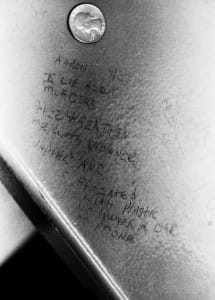
M.O.I. JR: How is Jon Burge connected with Aaron Patterson?
Attorney Demitrus Evans: Burge tortured Aaron, along with other police, in the false confession. He used the electrical shock method of torture as well as the other gun methods, including smothering with plastic and beatings. During the torture, Aaron etched into a bench with a paper clip he found “I Aaron Patterson lie about murders, tortured.” It is how his case was brought to light. The bench was preserved.
M.O.I. JR: What was Aaron Patterson convicted of? How long is his sentence?
Attorney Demitrus Evans: His sentence was 30 years. He was convicted of conspiracy to sell guns and narcotics.
M.O.I. JR: Is there anything else that we should know about the Aaron Patterson case?
Attorney Demitrus Evans: Because of the way it was handled in the mainstream media, including releases by the federal prosecutor’s office, there was a negative impact against Aaron and he was made to look like he was crazy. In fact, one of our defenses (mainly my idea) was that Aaron was psychologically disturbed for believing he could set up the police.
Having gone through part of the plight with him, I still believe he needs counseling for the torture, 17 years in prison for a crime he did not commit and thinking that he could – unscathed – interrupt a press conference of the prosecutor’s office in conjunction with the police and not have the type of repercussions that he did.
But I in no way believe that he is “crazy” in the sense that the stories are made up, because I witnessed the madness first hand.
The People’s Minister of Information JR Valrey is associate editor of the Bay View, author of “Block Reportin’” and “Unfinished Business: Block Reportin’ 2” and filmmaker of “Operation Small Axe” and “Block Reportin’ 101,” available, along with many more interviews, at www.blockreportradio.com. He can be reached at blockreportradio@gmail.com.

Attorney Demitrus Evans
Attorney Demitrus Evans began her career with Amnesty International and matriculated to the Federal Appellate Defender’s Office in 1997. She now heads TEIL Firms, The Evans International Law Firms, located 20 minutes from Chicago, at 10330 Roosevelt Rd, Suite 204, Westchester, IL 60154, 708-531-1740. Find her and the firm on Facebook and visit http://www.teilfirms.com/.
Aaron Patterson is in California
Aaron Patterson is currently in the federal prison at Atwater, California, 29 miles from Modesto. So send our brother some love and light – or better yet, arrange a visit: Aaron Patterson, 21664-424, USP Atwater, 1 Federal Way, Atwater CA 95301.





